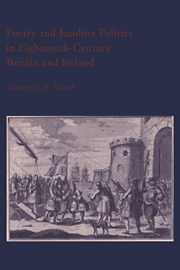Book contents
- Frontmatter
- Contents
- Acknowledgements
- Introduction
- 1 Invasion and xenophobia
- 2 The wee, wee German lairdie
- 3 The codes of the canon
- 4 Jacobite political culture in Scotland
- 5 Jacobite culture in Ireland and Wales
- 6 The demon's light
- 7 The tartan curtain
- Additional works
- Index
- CAMBRIDGE STUDIES IN EIGHTEENTH-CENTURY ENGLISH LITERATURE AND THOUGHT
3 - The codes of the canon
Published online by Cambridge University Press: 23 November 2009
- Frontmatter
- Contents
- Acknowledgements
- Introduction
- 1 Invasion and xenophobia
- 2 The wee, wee German lairdie
- 3 The codes of the canon
- 4 Jacobite political culture in Scotland
- 5 Jacobite culture in Ireland and Wales
- 6 The demon's light
- 7 The tartan curtain
- Additional works
- Index
- CAMBRIDGE STUDIES IN EIGHTEENTH-CENTURY ENGLISH LITERATURE AND THOUGHT
Summary
John Dryden
I must now come closer to my present business: and not think of making more invasive Wars abroad, when like Hannibal, I am call'd back to the defence of my own Country. Virgil is attack'd by many Enemies … their principal Objection being against his Moral … we are to consider him as writing his Poem in a time when the Old Form of Government was subverted, and a new one just established by Octavius Caesar: In effect by force of Arms, but seemingly by the Consent of the Roman People.
Dryden's Preface to the AeneidNot Great Aeneas stood in plainer Day,
When, the dark mantling Mist dissolv'd away,
He to the Tyrians shew'd his sudden face,
Shining with all his Goddess Mother's Grace …
Britannia RedivivaDryden's is the only major poetic career to span both Civil War and Revolution. Yet despite the fact that he has often been portrayed as a poet whose reaction to these turmoils was that of the Vicar of Bray, recent criticism has uncovered a consistency in his underlying approach to political change, a ‘longing for an irrecoverable past’ ‘already detectable in the Hastings elegy [of 1649]’, and directed towards the ‘golden dayes’ of ‘the court of Charles I, where ceremony and the arts had been prized as they would never be again’.
- Type
- Chapter
- Information
- Publisher: Cambridge University PressPrint publication year: 1994

